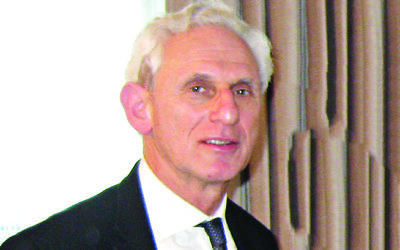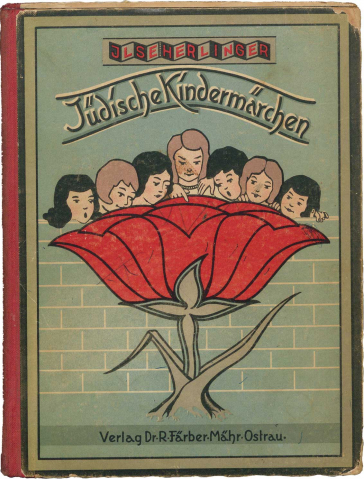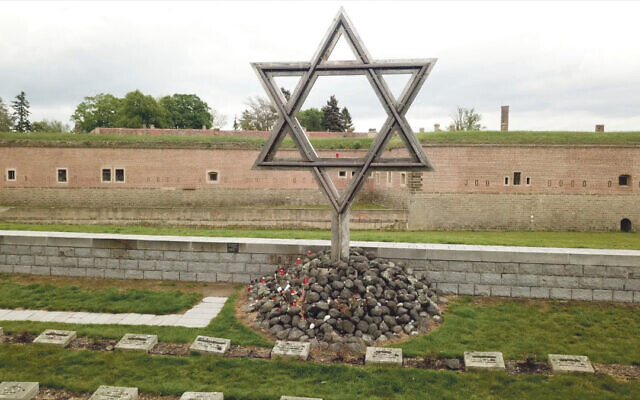OPINION: What my grandson taught me about remembering the Holocaust
Alex Brummer writes that remembrance, no matter how difficult, can be an inspiration to a younger generation keen to learn more about the Shoah
Alex Brummer is a Jewish News columnist and the City Editor, Daily Mail
When my daughter Jessica called earlier this month to tell me she was proposing to take my grandson Rafi to Auschwitz to help prepare him for his GCSE art project, I knew there was no choice but to be part of the expedition.
It would be my third visit to that dreadful place. The sheer horror of the previous two, in different circumstances, one with a friend and as part of an official UK government delegation, had been emotionally draining.
Rafi’s interest in going to the heart of evil where my paternal grandparents had died and several members of my family miraculously survived, touched me deeply. He has not attended Jewish schools but is keenly involved in the community through youth movements.

Somehow over the years I, among my globally distributed network of cousins, had become the repository for a sketchy family history (some of it recorded in newspaper articles). So, as Rafi explored his subject, I could be a useful source.
The timing was not ideal. My mind was still in turmoil after a visit to the Terezin (Theresienstadt) Ghetto in January organised by the European Jewish Association. The theme had been the ‘false narratives’ of the Nazis, exemplified by the showpiece camp filled with children and talented Jews from the arts. Tens of thousands died on site and were incinerated.
An incentive to go to Terezin was the belief one of my father’s brothers, who survived the Shoah, may have spent time there. His journey was a frightening odyssey which took him to four camps before making a life in Israel.
Terezin is an enigma, partly because of the permanence of the structures, some dating from the 19th century when it was an Austrian-Hungarian garrison and prison. Buildings which once housed Jewish victims in desperate overcrowded conditions, have been partly converted into municipal offices.
The most striking aspect was the art gallery. Jewish Czech artists and those from neighbouring areas had been put to work for the sophisticated Nazi propaganda machine.

Yet using fragments of waste and pilfered paper, they managed to produce art of the highest quality showing the privation of the camps, the brutalist treatment and work conditions of inmates. Artists such as Viktor Ullman and Ilse Weber, whose works illuminated the galleries, having served their purpose were ruthlessly shipped off to Auschwitz-Birkenau in the summer of 1944.
As Hitler’s war faltered, the manic determination to exterminate all Jews became ever more pronounced. Under the efficient direction of Adolf Eichmann, there was a hurried effort to rid Hungary of its Jews. My grandparents Sandor and Fanya, aunts, cousins and members of the wider family were loaded on to cattle trucks to Auschwitz for selection.
When you can put names, faces, characters and fragments of family history to the industrial scale of extermination it becomes more digestible. There is a strong history of art, painting and creativity in our family, and Rafi’s desire to translate the horror into pictures, I found profoundly moving. It chimed also with the terrible fate of those Terezin artists.
Terezin is an enigma, partly because of the permanence of the structures, some dating from the 19th century when it was an Austrian-Hungarian garrison and prison
Auschwitz is very different from the camp I visited before. Post-Covid, the visits and exhibits have been streamlined but not sanitised. The children’s shoes, the eyeglasses and cases with family names are no less effective.
Behind us, as we remembered our lost ones, was a large group of Orthodox young women from Israel in dark long skirts, some draped in the Israeli flag. As they entered the gates of Birkenau their voices rang out with the sacred words of the psalmist.
For Rafi, and us all, it was a moment which showed how relevant remembrance remains. Not everyone is able to bear witness first hand at the camps. The disputed Holocaust memorial at Victoria Palace Gardens will provide an accessible and permanent reminder of the grotesque nature of genocide principally against the Jews. It can be an inspiration to young people like Rafi and those defiant young Israeli women who want to know more.
- Alex Brummer is a journalist, editor and author.

Thank you for helping to make Jewish News the leading source of news and opinion for the UK Jewish community. Today we're asking for your invaluable help to continue putting our community first in everything we do.
For as little as £5 a month you can help sustain the vital work we do in celebrating and standing up for Jewish life in Britain.
Jewish News holds our community together and keeps us connected. Like a synagogue, it’s where people turn to feel part of something bigger. It also proudly shows the rest of Britain the vibrancy and rich culture of modern Jewish life.
You can make a quick and easy one-off or monthly contribution of £5, £10, £20 or any other sum you’re comfortable with.
100% of your donation will help us continue celebrating our community, in all its dynamic diversity...
Engaging
Being a community platform means so much more than producing a newspaper and website. One of our proudest roles is media partnering with our invaluable charities to amplify the outstanding work they do to help us all.
Celebrating
There’s no shortage of oys in the world but Jewish News takes every opportunity to celebrate the joys too, through projects like Night of Heroes, 40 Under 40 and other compelling countdowns that make the community kvell with pride.
Pioneering
In the first collaboration between media outlets from different faiths, Jewish News worked with British Muslim TV and Church Times to produce a list of young activists leading the way on interfaith understanding.
Campaigning
Royal Mail issued a stamp honouring Holocaust hero Sir Nicholas Winton after a Jewish News campaign attracted more than 100,000 backers. Jewish Newsalso produces special editions of the paper highlighting pressing issues including mental health and Holocaust remembrance.
Easy access
In an age when news is readily accessible, Jewish News provides high-quality content free online and offline, removing any financial barriers to connecting people.
Voice of our community to wider society
The Jewish News team regularly appears on TV, radio and on the pages of the national press to comment on stories about the Jewish community. Easy access to the paper on the streets of London also means Jewish News provides an invaluable window into the community for the country at large.
We hope you agree all this is worth preserving.






















